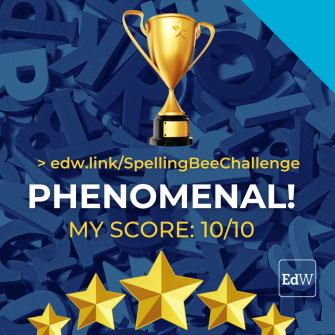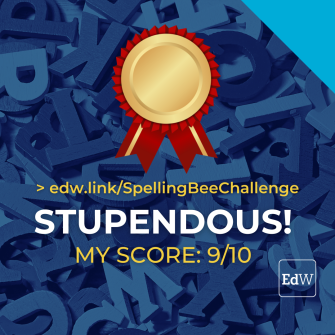In a world dominated by autocorrect and communication by emoji, a sacred annual gathering of linguistic student phenoms persists. These word whizzes have advanced from regional competitions to Washington to compete in the 96th Scripps National Spelling Bee this week.
As the competition unfolds on national television, these young minds will wrestle with contextual clues, etymology, and word origins to spell words that would stump most of us.
In 2023, champion Dev Shah, a 14-year-old from Largo, Fla., moved through the ranks by spelling schistorrhachis, aegagrus, rommack and tolsester, and finally took the championship by spelling psammophile. (Editor’s note: Four of these words are currently being questioned by autocorrect.)
In honor of the National Spelling Bee, Education Week made its own challenge using some multisyllabic words in educators’ lexicon. These are words teachers and administrators encounter—but can you spell them?
Take the challenge or put your students to the test. (And, if you miss a couple, at least you’re not on national television!)
Differentiation
For educators, differentiation refers to the tailoring of instruction to ensure all students can learn effectively regardless of their abilities or varying learning styles that work best for them.
Read "Differentiated Instruction: A Primer."
Disproportionality
In education, disproportionality refers to the representation of a particular demographic group compared to their proportion in the overall student population. For example, students from a demographic may be overrepresented or underrepresented in gifted and talented programs, special education, or STEM classes.
Read "A Guide to Special Education Terms."
Pedagogy
For educators, pedagogy refers to the methods and practices of teaching to enhance student learning and achievement.
Schema
A schema is mental model that allows students to categorize and understand information, and apply it to new contexts. For example, students who study about animal habits, ecosystems, and paleontology can apply the vocabulary and concepts they've learned when learning about a different interrelated system.
Read "A Reading Comprehension Glossary: Learn About the Key Components for Success."
Phonemic
Phonemic refers to aspects related to phonemes, which are the smallest units of sound in a language that can distinguish one word from another. Phonemic awareness—students' ability to recognize and manipulate the sounds in English—is crucial in teaching reading and writing.
Read "How Much Time Should Teachers Spend on a Foundational Reading Skill? Research Offers Clues."
Dysgraphia
Dysgraphia is a learning disability that affects a person's ability to write. Challenges can include difficulties with handwriting, spelling, and organizing thoughts on paper.
Read "Can AI Write a Good IEP? What Special Education Experts Say"
Morphology
The study of word parts and their meanings. Most words in academic language are comprised of multiple morphemes—units within words that shape the word’s meaning, such as prefixes, suffixes, and bases. Some studies show that explicitly teaching morphology can improve students’ word reading, spelling, and vocabulary knowledge.
Read "A Reading Comprehension Glossary: Learn About the Key Components for Success."
Dyscalculia
Dyscalculia is a learning disability that affects a person's ability to understand numbers and math. This can include basic skills and concepts in math, including place value, quantity, number sense, and arithmetic.
Read 'Dyscalculia and Dyslexia: Reading Disabilities Offer Insights for Math Support' to understand how new research could shape better math interventions.
Longitudinal
Researchers use longitudinal data—data that is collected sequentially over a long period of time, typically years—to study and gain insights into students' academic progress over time. It can help inform experimental or quasi-experimental studies, allowing for insights into program or curriculum effectiveness. This type of data can also help with data-driven decisions on resource allocation.
MisNAEPery
Trick question! It isn't a real word, but it was published in Education Week! In general, it refers to misuse of the scores from the federally administered "nation's report card"—officially known as the National Assessment of Educational Progress, or NAEP. Advocates have a tendency to use the scores in order to bolster favored policies and programs.
“It’s clearly not NAEP’s fault people misuse it, but it happens often enough that I feel compelled to call [such instances] ‘misNAEPery,’ ” said Steven M. Glazerman, a senior fellow at Mathematica Policy Research, a Princeton, N.J.-based research and policy-evaluation nonprofit.
Read 'When Bad Things Happen to Good NAEP Data' to understand the nuances of this data.
Download these images and share your scores!













